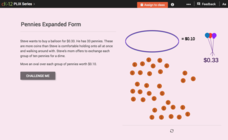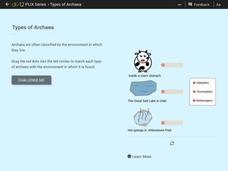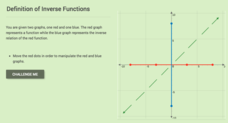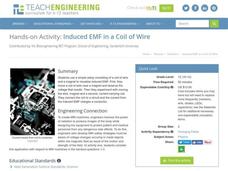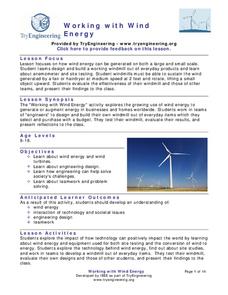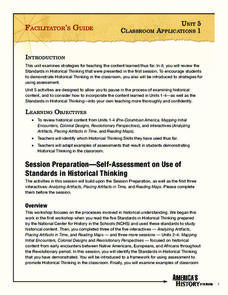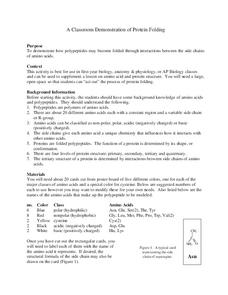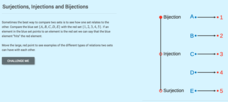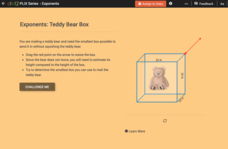Peace Corps
Brief Encounters
How are Pandyas different than Chispas? Explore cultural norms and societal behaviors with an engaging role-play activity. Split into groups of two hypothetical cultural groups, the formal Pandyas and the sociable Chispas, and another...
Maine Math & Science Alliance
Earth as a System
Ecosystem, human body system, weather system. We hear the word system a lot, but what does it really mean? In the activity, pairs or groups of learners discuss how a bicycle is a system and then analyze objects in their classroom and...
CK-12 Foundation
Numbers in Expanded Form: Pennies Expanded Form
Beginning with a word problem that poses the question of making groups of 10 pennies to translate into a single dime, pupils are challenged to make sense of the amount of dollars 33 cents is in expanded form.
CK-12 Foundation
Translation of Vectors and Slope: Identical Vectors
Translate vectors to find equivalent ones. An interactive shows 10 randomly displayed vectors. Pupils grab the vectors and move them to group them with similar vectors in magnitude and direction. Scholars find the groups of vectors that...
CK-12 Foundation
Types of Archaea
One of the few organisms that are classified by the environment in which they live include archaea. The video describes the phylogeny of the group and their major characteristics. It details how they reproduce and discusses the diversity...
CK-12 Foundation
Definition of Inverse Functions
Investigate the definition of inverse functions graphically. Using the interactive, scholars create a graph of a function and view its resulting inverse. They then determine whether a group of functions have inverses that are also...
CK-12 Foundation
Values Written as Powers: Binary Numbers 9 to 16
Challenge mathematicians to crack the binary code with an interactive that focuses on numbers nine to 16. A table reveals exponential equations to aid in answering multiple-choice questions. A discussion question gauges comprehension.
Alabama Department of Archives and History
Alabama's Steps to Statehood
To demonstrate their understanding of the steps Alabama took to become a state, groups create a poster that identifies what the United States Constitution and the Northwest Ordinance required of a territory to become a state.
Teach Engineering
Induced EMF in a Coil Wire
Small groups investigate the interaction between a coil of wire and a magnet to create an electromagnetic field and observe the voltage they create. Through further interactions, they realize a conductor can be charged from the...
Institute of Electrical and Electronics Engineers
Working with Wind Energy
After reading about how wind turbines work to collect clean energy, groups brainstorm and design their own windmill. Within the provided financial and physical constraints, groups must build a working windmill using only the materials...
American Chemical Society
Using Dissolving to Identify an Unknown
There is a solvent called aqua regis that can dissolve gold! After observing a solubility demonstration, groups receive four known crystals and one unknown. Based on the demo, they design an experiment to determine the identity of the...
Annenberg Foundation
America's History in the Making: Classroom Applications One
Someone finds a time capsule 100 years from now, and it includes your family photo album. What would the photos tell that person about you and your place in history? Scholars investigate how artifacts tell stories. Using photos, maps,...
Discovery Education
Our Brain and Body on Opioids
Use a presentation that explores the world of prescription opioids. Learners look at the way the brain responds to the drugs and the long terms effects opioids have on the brain and body. At the end of the lesson, groups create a social...
CK-12 Foundation
Repeating Decimals: Does 1 equal 0.999... ?
Six questions make up a challenging interactive that tests scholars' knowledge of repeating decimals. Mathematicians answer true or false and multiple-choice questions with help from a tool that highlights decimal movement in an...
CK-12 Foundation
Values Written as Powers: Binary Numbers 1 to 8
A six-question interactive tasks scholars with adding binary numbers one through eight. A tool acts as a visual aid to showcase the patterns made when working with base—2, digits zero and one. Question types include fill in the blank,...
Workforce Solutions
Workforce Solutions 2-3 Lessons
Four lessons and an at-home connection examine 12 jobs. Beginning with an interactive map, scholars view and discuss each one within their small group. Groups focus on the products provided and on their scarcity. Finally, pupils look...
Southwestern Medical Center
A Classroom Demonstration of Protein Folding
Does the mention of proteins and polypeptide relationships in your classroom result in mass confusion? Does the attempt to teach this important concept generate multiple questions and, at times, lead to a room filled with blank...
American Museum of Natural History
Welcome to the Dzanga-Sangha
One ecosystem is home to numerous habitats—how diverse are they? Pupils interact with an online lesson to explore three habitats in a rain forest ecosystem. They discover connections between species and how they depend on each other for...
CK-12 Foundation
Development of Theories
Theory or Law? You decide. And so will your class members, in an insightful interactive. Young scientists divide common scientific principles or statements between the two groups, then dig deeper in understanding the functions of...
CK-12 Foundation
Midpoint and Segment Bisectors: The Midpoint Formula
Let's meet in the middle. Given two points on the coordinate plane, pupils use the interactive to find the midpoint. The interactive provides a graphical display of the midpoint and the midpoint formula with the coordinates of the...
CK-12 Foundation
The Real Numbers: Surjections, Injections and Bijections
Inject a great interactive into your lesson plans. Scholars learn about injections, surjections, and bijections of sets. They use an interactive that shows an example for each of these relationships between sets.
CK-12 Foundation
Concept of Limit: Limit Notation
Limits to infinity are simple to find if you can compare numerators and denominators. Users of the interactive drag expressions to match with their limit as x approaches infinity. A set of challenge questions assesses their groupings.
CK-12 Foundation
Whole Number Exponents: Teddy Bear Box
Five questions—multiple-choice, fill in the blank, and discussion—make up an interactive that challenges scholars to mail a teddy bear using the smallest box possible without squishing it. A box with movable sides allows mathematicians...
CK-12 Foundation
Properties of Rational Numbers: Lollipop Trees
A six-question interactive takes mathematicians to Lollipop Land where they manipulate lollipop trees to make equivalent ratios. Question types include multiple-choice, true or false, and a discussion.


